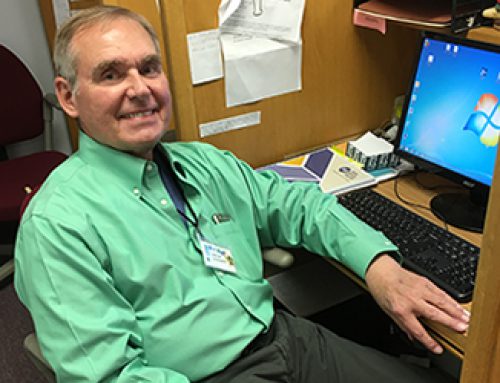Is it possible to have civil, even friendly conversations about current events these days?
Jim Fleming says a resounding yes. He’s been leading “Conversations in American Politics” as a volunteer at Oasis in Rochester since 2008, and says that civil discourse flourishes best if the right kind of group dynamic is established.
“I try to encourage civility by modeling it myself,” he says. “I make sure everybody has time to say what they want to say. Good teaching is to try to bring out their best, to make them feel good about their participation. That’s what I do. I think people leave feeling better about themselves and the world.”
Jim brings significant classroom experience to the group, having retired in 2007 after 40 years teaching liberal arts and political science at Rochester Institute of Technology. He says he especially missed the conversations with his students after he retired, so he gave Oasis a try.
He was back in a classroom, but Oasis students brought with them years of life experience and a different expectation for the breadth and depth of the conversations.
“These folks are former doctors, teachers, lawyers, scientists. They are very smart and didn’t want to be lectured to,” Jim recalls. “That’s when I decided it was best to shift. There’s no teaching here, just good conversations. The sessions are led by the participants, and I’m there to ask questions, add comments and keep the discussions going.”
Jim says his hidden agenda is that the participants are getting to know one another, and maybe themselves, a little better.
Talking, listening and learning
A self-described political junkie, retired librarian Joan Hopkins makes sure to sign up early for the “Conversations” class. She just doesn’t want to miss it.
“We feel so close to each other and to Jim. It’s that kind of atmosphere,” she explains, pointing out that the group and friendships even withstood the conflict-ridden 2016 election. “We’ve got liberals and conservatives, but the election never led to uncomfortable arguments in the class. We all know each other pretty well. I love that we can have a difference of opinion, but sill respect each other like we do.”
Joan credits Jim Fleming for the feeling and tone of the group.
“Jim is a very kind and gentle person,” she says. “He fosters an atmosphere that encourages people to contribute,” she says.
Joan was at first intimidated at the notion of leading a session, but over time has discovered that taking the lead is something she can do much more comfortably now.
“It’s really helped me grow as a person,” she says.
Joan takes other Oasis offerings as well, including yoga, which has yielded even more good friendships.
“That’s the wonderful thing. By participating, you get to know people. It’s another way to meet people. Belonging to Oasis is one of the most meaningful things in my life since retirement.”
Promoting lively debate
 Despite hot potato topics like the national election, the presidency, the economy, terrorism and racial conflict, civility reigns at Pacific Region Oasis in Los Angeles, as well, says Current Events Roundtable leader Earl Ofari Hutchinson.
Despite hot potato topics like the national election, the presidency, the economy, terrorism and racial conflict, civility reigns at Pacific Region Oasis in Los Angeles, as well, says Current Events Roundtable leader Earl Ofari Hutchinson.
“These topics dominated the discussion this year and at times the exchanges were fierce,” he says. “Our participants may differ, but they do so in a respectful way. I try to make it challenging and informative, but fun.”
Earl is an author and political analyst, as well as associate editor of New America Media and host of the weekly Hutchinson Report on KPFK 90.7 FM and the Pacifica Network. His ground rules for the roundtable are a bit different that Jim Fleming’s, but they work. He selects the discussion topics; participants are expected to do their own research and are then given an opportunity to present their findings and opinions. Then the floor is open for discussion and debate, which does get lively.
“I find the give and take among the participants, the tremendous attentiveness and the wellspring of experience and information that everyone brings to be very enjoyable.”
An appetite for in-depth information
 Politics aren’t the only current event.
Politics aren’t the only current event.
“People genuinely want to know what’s going on in the world,” says Molly Williamson. “There really is a hunger for information and discussion about the economy, environmental issues and other global phenomena that are not tied to current events.”
A former Foreign Service Officer who served six presidents and achieved the rank of Career Minister, Molly is a scholar with the Middle East Institute. She gives as many as 60 presentations a year across the country, including Johns Hopkins University. Her lectures at Washington Metro Oasis have been well-received.
“I never knew that there would be such a level of interest in current events around what we would call ‘global hotspots,’ those ‘geographic powder kegs’ like Pakistan, China, chaos in the Middle East, Russia and Syria,” she says. “But there is so much hunger for discussion on these kinds of topics.”
Molly says the public perception and demand for information has changed over time.
“When I joined the Foreign Service, the general thought was, ‘We need more information. Did something just happen?’ Decades later, we are bombarded with data points. I say to the many groups I speak to, ‘We are hungry for something that is not a 10-second sound bite.’ If we have to think about things on our own, we’re left adrift. Today, the quality of what we’re offered gets dumbed down because the media is already looking to the next story.”
She observes that the older adults who come to hear her are looking for two things: good information and engagement.
“The people I’m meeting are educated and intensely curious. They want their lives to be engaged and full,” she says. “I think once people have retired, their usual connections are chapters they’ve left behind. They’re looking to answer questions they still have, and they finally have time to think about it and do something about it.”



Leave A Comment